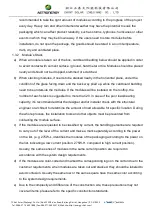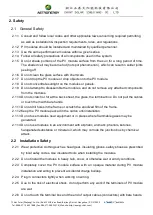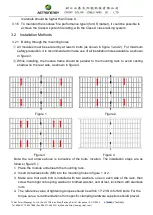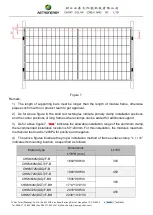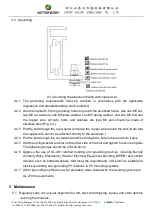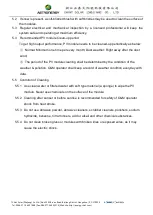
Chint Solar (Zhejiang) Co.,Ltd. | Add:1335 Bin´an Road, Binjiang District, Hangzhou | P.C: 310053
Tel: 0086-571-5603 1888 | Fax: 086-571-5603 2316 | Website: http://energy.chint.com/
4 Electrical Installation
4.1 Installation Condition
4.1.1 The electrical characteristics are within ±10% of the indicated values of Isc. Voc and
Pmpp under the standard test conditions (irradiance of 1000 W/m
2
, AM1.5 spectrum, cell
temperature of 25
℃
.
4.1.2 The IEC & UL standard maximum system voltage for the bifacial module series is 1500V.
4.1.3 Connect quantity of modules that match the voltage specifications of the inverters used in
system. Modules must not be connected together to create a voltage higher than the
permitted maximum system voltage under the lowest local temperature conditions.
4.1.4 Under normal conditions, a photovoltaic module is likely to experience conditions that
produce more current and/or voltage than reported at standard test conditions.
Accordingly, the value of I
sc
marked on this module should be multiplied by a factor of 1.25
when determining component conductor ampacities, fuse sizes, and size of controls
connected to the PV output.
4.1.5 Refer to Section 690-8 of the National Electrical Code for an additional multiplying factor
of 125%
(
80% derating
)
which may be applicable.
4.1.6 Each module (or series-connected string of modules) shall be provided with the maximum
series fuse, specified 20A for bifacial module.
4.1.7 Use a special solar cable and plugs for installing the PV system and make sure that all
connections are safe and tight. The cable should be 4 mm
2
(12AWG), and able to
withstand the maximum possible system open-circuit voltage.
4.1.8 Bypass diodes are included in module junction boxes to avoid decreased module
performance in the event of shade. Please check the relevant product datasheet for the
specific diodes of J-box.
4.1.9 Prohibit interconnection between different types of connectors.



